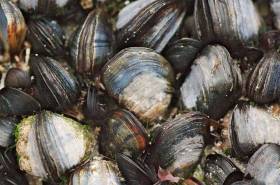Displaying items by tag: PRIMROSE
Marine Institute Leads New Project In Predicting Shellfish Safety
#Shellfish - Predicting risk and impact of harmful algal bloom events that cause impact to the shellfish aquaculture sector (PRIMROSE) is a new €2.7-million marine science project led by the Marine Institute.
The project is funded by the Interreg Atlantic Area Operational Programme and includes 10 research and SME partners from five countries along the Atlantic Arc from southern Spain to the Shetland Islands.
During the next three years, the PRIMROSE project will form a network of scientists and industry members to produce an inter-regional toxin and microbiological advisory and forecasting capability to the European aquaculture industry.
“The project will produce applications based on reusing existing monitoring data, modelled coastal hydrodynamics, satellite and other novel aerial observations, meteorological, historical and recent trend data to predict and give early warning of toxic blooms and elevated microbiological events,” said project coordinator Joe Silke, from the Marine Institute.
“This will allow fish and shellfish farmers to adapt their culture and harvesting practices in time, in order to reduce potential losses.”
The Marine Institute will implement the lead role of co-ordinating the project and ensure that all the work packages, actions, deliverables and results are achieved.
Already a strong partnership approach has been established during the project preparation. By consolidating and further developing the regional knowledge capital that exists, the consortium is confident of a successful outcome.
Partners will participate in a suite of six work packages and will develop a sustainable product that will be largely automated to predict and produce regular published reports for the long term once the project is finished.
In recent years, there has been much discussion of satellites being able to track surface algal blooms. Understanding biological phenomena in the ocean requires a complex approach, though there is some merit in using satellite derived chlorophyll images to delineate high biomass near surface algal blooms.
Much cutting edge harmful algal bloom research work has focused on subsurface profiles, where certain species are present in thin layers of limited geographical extent often associated with strong density interfaces. Phytoplankton blooms, micro-algal blooms, toxic algae, red tides, or harmful algae, are all terms for naturally occurring phenomena.
Clearly, in order for a toxic, harmful algal bloom, or a microbiological forecast to be realistic, physical factors including changes in water column structure and transport pathways are necessary.
“PRIMROSE is the next step towards providing an operational advisory service by integrating physical oceanographic drivers with a variety of biotoxin, phytoplankton count and microbiological data,” said Silke. “A distributed advisory service and a network of thematic experts distributed across the participating countries will then network to provide regular advisory products and forecasts of impending toxic and harmful algal events.”
PRIMROSE brings together experts in the areas of modelling, Earth observation, harmful algal bloom and microbiological monitoring programmes and end users to assemble a number of key data sets and build upon and explore new forecasting options.
The consortium includes three UK partners (Seafood Shetland, Scottish Association for Marine Science and Plymouth Marine Lab) two Irish partners (Marine Institute and Bantry Marine Research Station), one partner in France (IFREMER), three in Spain (AZTI, Instituto Oceanographico Espanol and AGAPA) and one in Portugal (Institute Technico Superior/University of Lisboa).
The Marine Institute recently issued a recruitment call for a data analyst and project co-ordinator for the PRIMROSE project, as previously reported on Afloat.ie.
























































